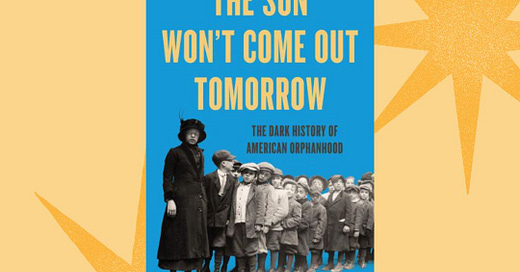What I'm Writing/What I'm Reading
Plus two opportunities to get THE SUN WON'T COME OUT TOMORROW for 25% off!
Starting off this missive with time-sensitive news: You can preorder my book The Sun Won’t Come Out Tomorrow: The Dark History of American Orphanhood for 25% off! Both Barnes & Noble and Hachette are running sales—here are the deets:
At Barnes & Noble, use code PREORDER25 through 7/17. Book link here!
At Hachette (my publisher), use code SUMMERSANTA for 25% off and free shipping on orders of $45+. Book link here!
A few other Hachette books I’d recommend to get you over the $45 mark: fellow Bold Type author and pal Jack Lowery’s It Was Vulgar and It Was Beautiful: How AIDS Activists Used Art to Fight a Pandemic (now in paperback!), Leslie Jamison’s memoir Splinters, Emma Copley Eisenberg’s memoir/narrative nonfiction hybrid The Third Rainbow Girl: The Long Life of A Double Murder in Appalachia
A bonus deal! Bookshop.org, which is my favorite online bookstore because they support indies, is running a sale through tomorrow: free shipping on all orders, and get a free tote bag with an order of $100 or more. Book link here!
Now, for some recent book reviews:
A few years ago, I underwent genetic testing to find out if at risk for an inherited cancer syndrome—something that might explain why so many members of my family have been struck with cancer, including my parents. For The New Republic, I wrote about that experience alongside a consideration of journalist Lawrence Ingrassia’s book A Fatal Inheritance: How a Family Misfortune Revealed a Deadly Medical Mystery. You can read the review essay here. I highly recommend the book if you liked Siddhartha Mukherjee’s The Emperor of All Maladies.
Over at The Washington Post, I reviewed Cory Leadbeater’s memoir The Uptown Local: Death, Joy, and Joan Didion (gift link here). Leadbeater was Didion’s personal assistant during the last nine years of her life. While the book does offer details of Didion’s everyday life and the philosophies that undergirded it, it eschews a dishy approach. It is less a revelation of life with Didion than a poetic, ruminative chronicle of Leadbeater’s struggle to synthesize the author’s sophisticated world with that of his lower-middle-class family.
And for NPR, I reviewed two debut novels that I think would make great beach reads in the sense that they are both set on beaches and are propulsive: Alina Grabowksi’s Women and Children First and Elizabeth O’Connor’s Whale Fall.
Finally, a two other recs:
Pamela Colloff is hands-down the queen of longform criminal justice reporting. Her latest for ProPublica and the NYT tells the story of Russell Maze, a man who was convicted of killing his infant son in the early 2000s, in a case of supposed “shaken baby syndrome.” The district attorney now believes that Maze’s conviction was based on faulty science and that he is innocent, but he still has limited recourse. This article isn’t explicitly about child welfare, but it does touch on the dangers of over-identifying physical child abuse, even when evidence is very weak. Read it here.
Journalist and filmmaker Myah Overstreet’s short documentary To Be Invisible follows two Black mothers fighting to get their children back from foster care in North Carolina. It’s a stark look at the injustices of family separation—watch it on the New Yorker’s website.
That’s all from me for now! Thanks for reading.




